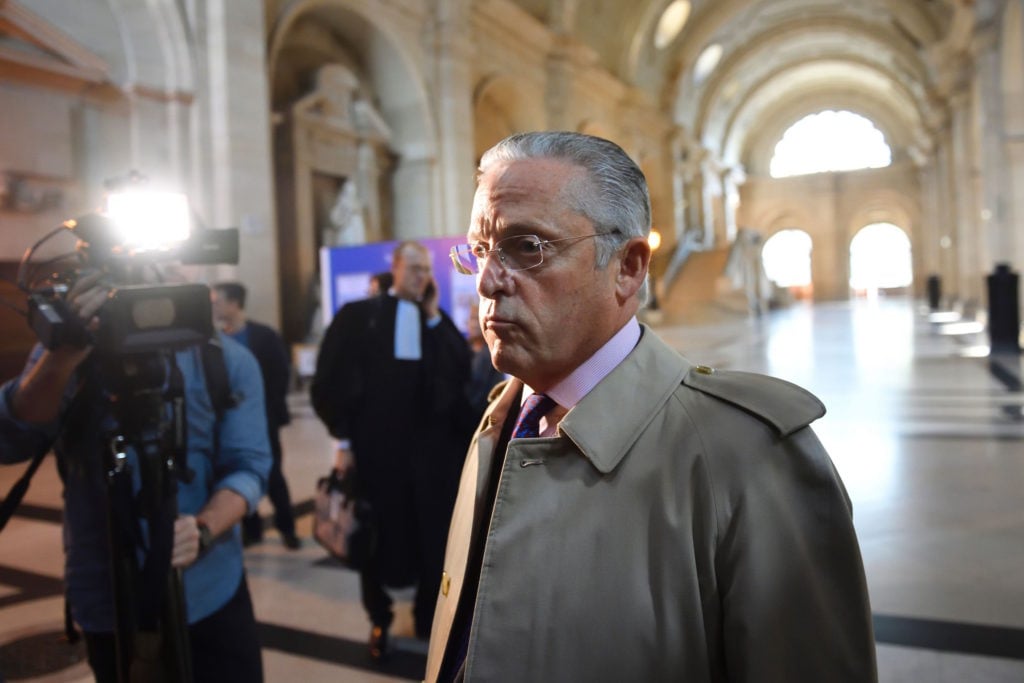Law & Politics
Wildenstein Fraud Trial Wraps Up
The defense portrayed Mr. Wildenstein as an eternal child of innocent spirit.

The defense portrayed Mr. Wildenstein as an eternal child of innocent spirit.

by
Robert Williams

In the final week of the trial of the Wildenstein family for tax evasion and money laundering, the defendants argued that the art-dealing family and their associates should be acquitted.
In what the prosecution has called the “longest and most sophisticated fraud of the fifth French Republic,” the Wildensteins are accused of using a web of offshore trusts and shell corporations to reduce the tax bill for the estate of the late Daniel Wildenstein by as much as 500 million euro, according to French tax authorities.
Prosecutors Mireille Venet and Monico d’Onofrio urged the court last week to punish Guy Wildenstein—now the patriarch of the art dealing clan and president of the storied New York gallery Wildenstein & Co.—with a four-year prison sentence with two years of hard time, as well as a 250 million euro fine.
As 186 galleries welcomed visitors at Paris’s Grand Palais for FIAC’s 43rd contemporary art extravaganza—which has courted its own tax controversies—lawyers for Mr. Wildenstein were fending off accusations that their client was a master of “financial impressionism.”
The defense portrayed Mr. Wildenstein as a sort of eternal child of innocent spirit, who, at 70 years old, still refers to his late father as “papa.”
How, then, the lawyers asked, could Mr. Wildenstein be held accountable for failing to question the legality of the system of trusts that had been put in place not just by his father, but by his father and grandfather? Guy Wildenstein claims to have never created or contributed money to an offshore trust, and claims to have always paid U.S. taxes on the distributions he received from the trusts.
“You can inherit a fortune, but you can’t inherit a crime,” said Hervé Temime, head lawyer for Mr. Wildenstein. “And when that crime doesn’t exist, and you never wanted to commit it—it’s impossible that you should bear the blame.”
Mr. Wildenstein’s defense was joined by the lawyers of other defendants in pointing out repeatedly that individuals in France were not explicitly required to declare the value of offshore trusts before the passing of a 2011 law—nearly 10 years after the death of Daniel Wildenstein.
“I shouldn’t have to remind the court that laws are not retroactive,” said Jean-Yves Leborgne, the lawyer for a notary being charged as an accomplice for signing off on the family’s tax declarations. “The actions being demanded the French tax authorities are motivated by regret—regret that the taxes on this fortune could have escaped their grasp.”
For the prosecution, the previous lack of clarity on whether trusts had to be declared is irrelevant, as the Wildenstein family never seems to have relinquished control of the goods that were formally owned by trusts. The trusts being “fictional,” the goods within them should have been taxed as property in any case.
For the first time in France, financial institutions from tax havens found themselves in the crosshairs of prosecutors for helping to set-up and maintain systems like the Wildensteins’ for offshoring wealth.
The defense for the Guernsey-based Northern Trust Fiduciary Services disparaged the prosecution for their France-centric interpretation of the law.
“Northern Trust has perfectly respected its own national laws…. Is this court in a position to decide that the law is more or less honorable here than across the English Channel?”
The presiding judge Olivier Geron announced that the court would take several months to review the case, with a verdict expected January 12, 2017.
The air of scandal is unlikely to let up for Guy Wildenstein while waiting for the court to determine his fate. In the French periodical Challenges yesterday, Yves Rouart of the Rouart art dealing dynasty renewed his accusations that Guy Wildenstein is behind the disappearance of three Manets that went missing from his late aunt’s estate.
An investigation in May of the Wildenstein’s stockpile of art in the Geneva Freeport reportedly uncovered listings of Manet paintings that arrived in 2016 of which the titles were not specified. “I’m am of the conviction,” Rouart told Challenges, “that these could well be my aunt’s paintings.”
The tribunal will take three months to come to a decision.